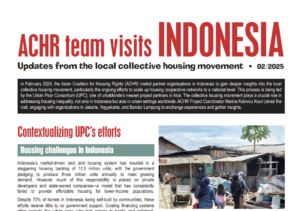The Collective Housing Landscape in Indonesia

In February 2024, the Asian Coalition for Housing Rights (ACHR) visited partner organizations in Indonesia to gain deeper insights into the local collective housing movement, particularly the ongoing efforts to scale up housing cooperative networks to a national level. This process is being led by urbaMonde‘s partner, the Urban Poor Consortium (UPC).
Indonesia faces a severe housing shortage of 12.5 million units, with the government aiming to build three million homes annually. However, reliance on private developers and state-owned companies has failed to deliver affordable housing for low-income populations. While 70% of homes are self-built by communities, these efforts receive little government support, and financing systems largely exclude the urban poor. Rapid urban development further threatens vulnerable communities with displacement.
Collective housing, based on shared ownership and participatory decision-making, offers a more sustainable and inclusive alternative. This model lowers costs, prioritizes vulnerable populations, and fosters social cohesion, making it a crucial solution amid Indonesia’s ongoing urbanization.
Since 2017, government support has enabled participatory programs like the Community Action Plan (CAP) and Collaborative Implementation Program (CIP), which have upgraded 21 kampungs with plans to expand to 445 in Jakarta. Additionally, government-funded housing reconstruction for evicted communities has granted cooperatives management rights, allowing for future ownership.
Building on this success, UPC and urbaMonde are working to replicate these strategies in eight other Indonesian cities facing similar housing challenges. At the national level, the project also seeks to reform outdated land laws and promote cooperatives as key actors in urban housing by advocating for collective land rights.
Find out more about the diverse collective housing landscape in Indonesia by reading the full report. (02/2025)

